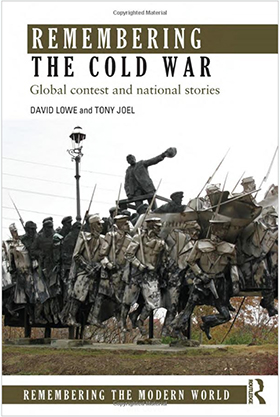What is your memory of The Cold War? New book looks at how the war that didn't happen is remembered
Media release
For many The Cold War is the stuff of abstract references brought to life through spy novels, movies such as James Bond and other TV telemovies, yet for Deakin University historian, and Director of the Alfred Deakin Research Institute (ADRI) Professor David Lowe, the effects of The Cold War continue to shape national identities and international politics.
In a new book, to be launched this Thursday, April 3, Professor Lowe and fellow Deakin historian, Dr Tony Joel, look at the way the Cold War is being remembered or commemorated and also how its impacts are playing out today.
"Unlike other wars, the Cold War was a war that didn't actually happen," explained Professor Lowe.
"It affected lives, affected countries and certainly shaped the politics we experience today but as with all history and the way its stories are told it is important to notice what is being left in and what is being left out."
Professor Lowe said remembering history was an intensely political act and the book showed that while people thought of the Cold War as being a European event, its impacts spread to other parts of the world.
"The ramifications of the Cold War extended into Asia and can be seen in the rivalry between China and Japan," he said.
"What is interesting is that we are beginning to see the flickerings of memory in political and social divisions in the Asia Pacific forums and island disputes."
"In Vietnam, too, the high level of construction work means that bones of fallen soldiers from the Vietnam war are being disturbed, and this accentuates a strong connection with ghosts that inhabit villages, sites of killing, and contested patches of land."
Professor Lowe said Russia for instance has been determined not to lose its identity as part of Europe and has used its role during the Second World War to support these ambitions, yet at other times it has been equally happy to embrace the political divisions from the Cold War.
"In the conflict involving, Russia, the Ukraine and Crimea for instance we are seeing not only the ongoing tensions over wounds inflicted by different ethnic groups around 70 years ago, but also the ongoing definition of nation-states and regions according to differences between some groups and neighbouring groups," he said.
"This definitional work draws on constant engagement with the interpretation of the past, and, alongside other great episodes, the Cold War plays a swirling mixture of roles according to each groups' needs."
Professor Lowe said there was a burgeoning interest in the Cold War.
"People crave remembering wars," he said.
"In the beginning it was more like a real war, and across the whole of Northern Europe there are bunkers, observation posts and other sites that you can visit," he said.
"But as time has gone on, it was very social in the way it was experienced, it was the war that didn't happen and for people in Europe as well as the rest of the world it was played out in popular culture such as the movies which increased the level of social engagement."
